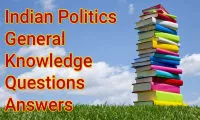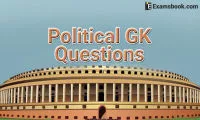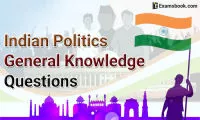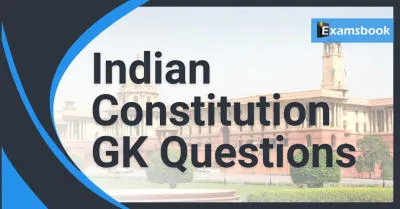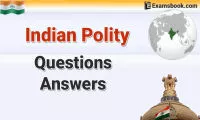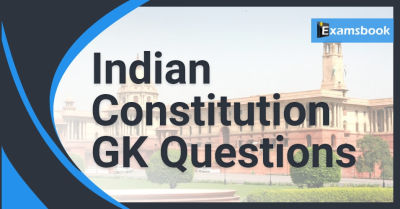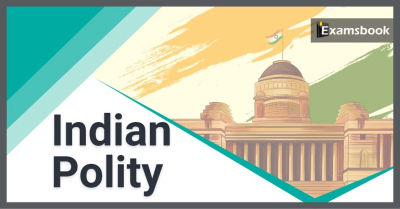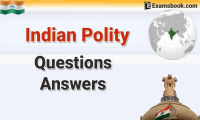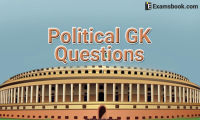- Free Test Series, Mock tests and Practice Tests
- Time proven exam strategies
- Exam analysis and simulated tests
- Hand-on real time test experience

Recently Added Articles View More >>
Welcome to our Indian Polity General Knowledge blog, your ultimate guide for mastering the essential concepts and facts for SSC Exams. Indian Polity, a crucial component of the SSC syllabus, encompasses the structure,
Welcome to our Constitution GK Quiz for Competitive Exams blog! This dedicated space is your go-to resource for mastering the intricate details of the Constitution of India whether you're preparing for UPSC, SSC, banking exams, or other competitive tests.
Welcome to our Constitution General Knowledge Quiz and Answers blog! Dive into the depths of legal history and governmental principles as we explore the foundation of our society through this engaging quiz.
Embark on a journey of knowledge with our Top 30 General Knowledge Questions and Answers blog! From history to science, geography to pop culture, our carefully curated selection of trivia will challenge and entertain you.
Welcome to our comprehensive guide on tackling Indian Constitution questions for SSC exams. The Indian Constitution serves as the foundational document that governs the world's largest democracy, providing a framework for governance, rights, and duties of citizens.
Delve into the intricate fabric of India's governance system with our Indian Polity Questions for SSC Exams blog. Explore a comprehensive array of curated questions that unravel the layers of the country's constitutional framework, governance, and political processes.
The field of politics and governance encompasses a wide array of concepts, structures, and principles that shape the functioning of societies around the world. Understanding the fundamentals of polity is crucial in comprehending how governments operate, how laws are formulated, and how societies are governed.
Understanding the Indian polity general knowledge questions is crucial for success in various competitive exams like the Staff Selection Commission (SSC) examinations. SSC aspirants need a firm grasp of the country's political structure, governance, and constitutional framework to excel in the General Knowledge section.
Most Popular Articles
Most Popular Articles
Recently Added Questions
In which year, the name of Laccadive, Minicoy and Aminidivi Islands was changed in Lakshadweep by parliamentary act-
701 0 65310b342f3bde70c147474d- 11973true
- 21971false
- 31970false
- 41972false
- Show Answer
- Workspace
- SingleChoice
Answer : 1 1973
Explanation :
Lakshadweep was formerly known as Laccadive, Minicoy and Aminidivi Islands.
- 128false
- 227false
- 330false
- 429true
- Show Answer
- Workspace
- SingleChoice
Answer : 4 29
Explanation :
Currently, there are 29 states and 7 union territories in India.
- 15false
- 27true
- 39false
- 46false
- Show Answer
- Workspace
- SingleChoice
Answer : 2 7
Explanation :
There are seven union territories in India. These are Delhi, Puducherry, Chandigarh, Dadra and Nagar Haveli, Andaman and Nicobar Islands, Daman and Diu and Lakshadweep.
The division of power and Independence of judiciary are two important features of –
678 0 6530f5b835474a6bcf36aa11- 1Democratic character of governmentfalse
- 2Federal character of governmenttrue
- 3Socialist character of governmentfalse
- 4Unitary character of governmentfalse
- Show Answer
- Workspace
- SingleChoice
Answer : 2 Federal character of government
Explanation :
The Constitution of India establishes a federal system of government. It contains all the usual features of a federation Viz., two government, Division of powers, written constitution, Supremacy of constitution, Independent judiciary and Bicameralism. Article 1 says that India is a union of states which implies two things: first, Indian federation is not the result of an agreement by the states and second, No state has the right to secede from the federation.
- 1Federalfalse
- 2Federal with strong unitary basefalse
- 3Confederationfalse
- 4Union of statestrue
- Show Answer
- Workspace
- SingleChoice
Answer : 4 Union of states
Explanation :
(a) Federal: This term typically refers to a system of government where power is divided between a central authority and regional entities. India's political system is federal in nature as it includes both a central government and individual state governments.
(b) Federal with Strong Unitary Base: India's federal structure contains elements of both federalism and unitarism. While it is primarily federal, there are strong unitary features, meaning the central government has significant powers, especially in crucial areas like defense and national security.
(c) Confederation: This term refers to a loose union of states where they retain most of their independence and delegate only a few powers to a central body. India is not a confederation; it is a federal union where states have their own governments but are bound together under a strong central authority.
(d) Union of States: This accurately describes India's political structure as mentioned in Article 1 of the Indian Constitution. It signifies that India is a union comprising individual states and union territories, emphasizing both the unity of the country and the diversity and autonomy of its states.



